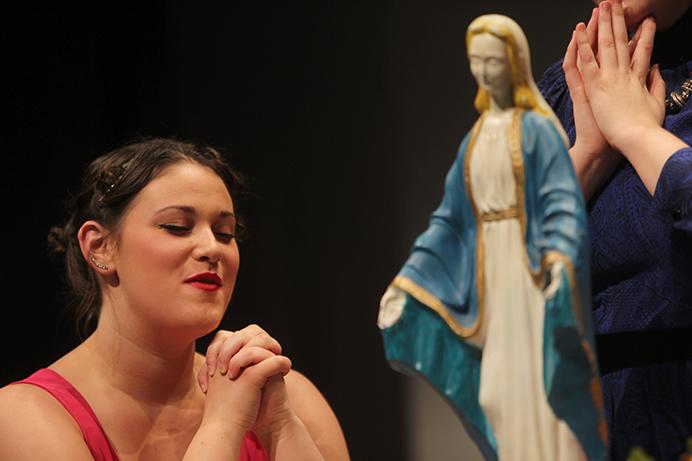By Hannah Crooks
From a strong female lead to her Puerto Rican roots, several aspects of the play Sarita stood out to University of Iowa student Rubina Vidal as she went through the process of selecting the first play she would direct.
Vidal was struck by how much resonance existed between the play’s narrative and that of her own life.
“The first time I read it, I was immediately drawn to the protagonist being a girl … because I am a strong feminist, I thought, ‘Yes, I like this,’ ” she said. “Also, I am a Puerto-Rican American. So connecting to the Cuban-American culture aspects that are in the play, I saw some of that in my real life.”
She was more drawn to the down-to-earth embrace of the characters’ flaws.
“None of the characters are perfect,” Vidal said. “There’s all these imperfections in each of them, which makes them human. It’s a very humanistic script, and I really loved that. And as an actor who is now directing, I saw a lot of opportunities for the actors to be able to discover these characters, and they are such complex characters.”
Sarita, which will open in Theater Building’s Theater B on Friday with a second performance on Saturday, is a coming-of-age story about a young Cuban-American girl growing up with the struggles of culture and family, teen pregnancy, and, yes, murder.
The play, written by playwright Maria Irene Fornes, is about the conflict between the eponymous Sarita (Lily DeTaeye) and two men, one of whom she lusts after and the other she thinks may be “the one.” With her best friend, Yeye (Shelby Zukin), she navigates the love triangle and finds, in the end, which guy is best for her.
With this being her first lead role, DeTaeye appreciates the lengths to which her cast and director have gone to help her grow.
“We all come in with this understanding that we’re going to make mistakes in rehearsal, and things aren’t always going to go right,” she said. “It’s this understanding that we all come in with, ‘That’s OK, just go explore, even if it looks stupid,’ because that’s just part of the process. That means a lot to me.”
This cast closeness and freedom to test the waters of many methods has been especially helpful, given the subject matter of the play.
“We’ve all kind of been in toxic relationships,” she said. “I’ve never been in a role that’s allowed me to explore that part of my experience, so that’s cool that I get to do that and portray it in a way that I don’t think I would handle it.”
Zukin understands both her character’s hopefulness and resilience and the life experiences of Sarita, such as family disputes.
“I actually relate a lot to Yeye,” she said. “I worry about other people before I worry about myself, so that was very nice to have that relationship with her. But I also relate a lot with Sarita’s character, which is really cool not playing Sarita, because it allows me to see Sarita and see what she’s going through and know how to help her through that as if I were her best friend.”



